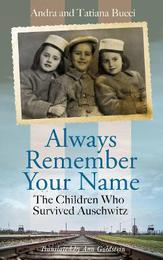
|
Always Remember Your Name: The Children who Survived Auschwitz
Paperback / softback
Main Details
| Title |
Always Remember Your Name: The Children who Survived Auschwitz
|
| Authors and Contributors |
By (author) Andra & Tatiana Bucci
|
| Physical Properties |
| Format:Paperback / softback | | Pages:192 | | Dimensions(mm): Height 216,Width 135 |
|
| Category/Genre | Memoirs
The Holocaust |
|---|
| ISBN/Barcode |
9781786582041
|
| Audience | |
|---|
|
Publishing Details |
| Publisher |
Manilla
|
| Imprint |
Manilla
|
| Publication Date |
20 January 2022 |
| Publication Country |
United Kingdom
|
Description
On 28 March 1944, six-year-old Tati and her four-year-old sister Andra were roused from their sleep and arrested. Along with their mother, Mira, their aunt, and cousin Sergio, they were deported to Auschwitz. Over 230,000 children were deported to the camp, where Josef Mengele, the Angel of Death, performed deadly experiments on them. Only a few dozen children survived, Tati and Andra among them. Tati, Andra, and Sergio were separated from their mothers upon arrival. But Mira was determined to keep track of her girls. After being tattooed with their inmate numbers, she made them memorise her number and told them to 'always remember your name'. In keeping this promise to their mother, the sisters were able to be reunited with their parents when the Second World War ended. An unforgettable narrative of the power of sisterhood in the most extreme circumstances, and of how a mother's love can overcome the most impossible odds, the Bucci sisters' memoir is a timely reminder that separating families is an inexcusable evil.
Author Biography
Andra (b. 1939) and Tatiana Bucci (b. 1937) were born in Fiume, the daughters of a Catholic father and Jewish mother. They were deported to Auschwitz along with their mother, grandmother, aunt and a cousin. When the camp was liberated, in 1945, they were sent first to Czechoslovakia and later to England, where their parents finally tracked them down. They were reunited with their parents in 1946. Today, they bear witness in schools and at the camps.
|